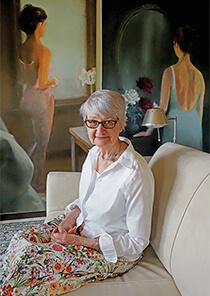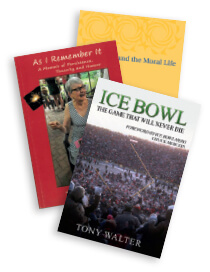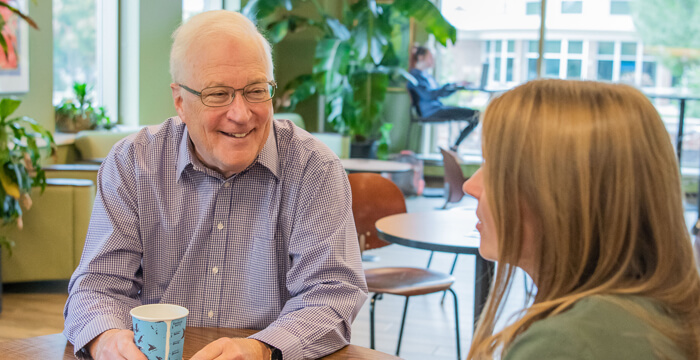Vocation Is an Itinerary of Hope
There are periods off from work, career changes and the promise of freedom in retirement, but as Paul Wadell (Theology & RS, Emeritus) says, there is no vacation from your vocation. The calling to do something life-affirming, something for the greater good, only deepens with time. New callings, too, may appear unannounced even into the later years of life.
“I’m an old enough Catholic that I was raised on the language of vocation,” says Wadell. “My parents always told us to pray to know our vocation,” But his fascination with the subject didn’t begin in earnest until he arrived at SNC and was asked to oversee the faculty and staff development portion of the Lilly Endowment-funded Faith, Learning & Vocation program.
“At the time, vocation in the Catholic Church was very tightly associated with ‘are you called to the priesthood or religious life’,” Wadell says. “This program really broadened my sense of what is vocation, and I became deeply fascinated with it. It’s not just ‘what is my career?’ or ‘am I going to be married or be single?’ Every day we are called, to be attentive, to be responsible, be kind, be alert, to be aware of other people. That really was a spark for me. It took an idea that I was familiar with and opened it up to a broader, richer meaning. I was captivated, fascinated.”
First the convent, then the canvas That broader meaning would resonate with Theresa Wanta ’69, who entered a convent at the age of 14. “I wanted to get off the farm. … I wanted to broaden my knowledge,” she says. She was told she could be an artist, but after taking her vows, she was sent forth to teach.
That broader meaning would resonate with Theresa Wanta ’69, who entered a convent at the age of 14. “I wanted to get off the farm. … I wanted to broaden my knowledge,” she says. She was told she could be an artist, but after taking her vows, she was sent forth to teach.
Feeling restless, she then took on a new challenge: working with abused and impoverished children in the South. Her veil brought her a great level of trust from the families. She loved the children and notes that she became “quite good” at teaching, but religious life was hard for Wanta: “I could see the convent was dying. … I did not want to be part of a dying thing, and I really wanted to pursue the fine arts. I was 36 at the time.
“I left to get my Bachelor of Fine Arts at Stevens Point. I left, and I got $500 to start with; it seemed like a lot. I held three jobs and went to school. I had nothing, I didn’t even have a salt and pepper shaker.”
A few corporate design jobs followed, but a bout with carpal tunnel forced Wanta to once again change course. So, she set off to New York City and, late in life, got her master’s degree in art from the New York Academy of Art: Graduate School of Figurative Art. She wanted to teach art but, at 52, there was a new hurdle to overcome: “I had an issue with my back, and I couldn’t work. I was too embarrassed to go on disability, coming from my farm background and taking care of yourself.
“They said I could get off disability if I started my own business selling my art. And that’s what I did.”
Wanta’s work has now been shown in dozens of galleries and received numerous awards.
Vocational communities
Since SNC’s Faith, Learning & Vocation program began in 2000, it has set SNC faculty and staff thinking about questions like these, questions of calling and human flourishing. “I was worried,” says Wadell. “ ‘What if nobody says anything?’ But from the beginning people were very anxious to talk at a deeper level about working at the college as a vocation or deeper calling.” Wadell and the center’s then-director, Julie Massey ’87, remained involved with vocational work in the following years with the formation of NetVUE, a network that aims to help colleges educate future leaders “who are eager to sustain a life of service that is guided by a sense of calling.”
Meanwhile, that spark Wadell felt mid-career has become a burning passion in retirement. He says, “Vocation is so important in light of the problems in our world today, the division, the polarization. That vocation is our way of calling attention to living for something greater than ourselves. … And it’s at the heart of what a liberal arts education is.”
Two passions, two careers
After decades in journalism, primarily with the Green Bay Press-Gazette, Tony Walter ’69 was thrust into a second vocation: “I had attended a church weekend function and met a man who had been working with the youth. He asked me to work at camp. Jokingly, he said to just try it for one year. Well, you don’t just do those things for one year. I got hooked.”
Walter says, “It was very early in my ministry. … I had a busy day at the newspaper, and it was our regular youth meeting that night. I told my wife I wasn’t sure if I was going to go. There were others who could fill in if I didn’t make it. And then at the last minute I thought, ‘Oh, I’ll just go.’ A young girl, about 16, asked if she could talk. I looked at her and said, ‘What’s on your mind.’ … I could tell that she had tears in her eyes, and she said, ‘I thought about killing myself this afternoon.’ ”
Moments like those made Walter confident he was doing what he was called to do: “It was the greatest lesson because the most important thing when working with youth is showing up.” He balanced journalism and ministry for a while, and then in the mid-90s, with his children now out on their own, he took a youth ministry position in South Carolina, then one in Milwaukee. Eight years later, he returned to the PressGazette to be near his son’s growing family. Walter learned to never look back with regret or questioning. He chooses to follow the impulse of what he wants to do, and what is the right thing to do.
Walter retired from the newspaper in 2012 and continued to work in youth ministry on a part-time basis. Meanwhile, his desire to write never wavered: He is the author of three books on the Green Bay Packers – all published in later life.
Retirement is just another chapter
It’s a restlessness that Wadell can relate to. He himself was left searching in retirement. “I felt like I lost my footing; I felt off balance,” Wadell says. “Ken Zahorski (English, Emeritus) told me, ‘Paul, it’s important to retire with a plan.’ I think that’s hugely important. … Retirement gives you the opportunity to refocus your priorities away from work.”
Wadell has connected with old friends, satiated his love for cycling and reinforced his understanding that vocation is a lifelong journey, with retirement just one chapter. He travels to NetVUE schools across the country, giving presentations and sharing this passion for helping others find and nurture their callings. “It’s important to listen to what our heart is telling us. … Sometimes we drown that out with the noise, the clutter in our lives,” Wadell says. “Instead of looking through the perspective of what’s in it for me, vocation changes all of that. The focus is more on how can I make the world better in small, everyday ways.”
A lifelong advocate for others
The new Wisconsin state director of the AARP – formerly the American Association for Retired Persons, an organization wholly dedicated to flourishing in later life – is Martha Cranley ’83, who herself took time to evaluate her career and vocational ambitions at the onset of the Covid-19 pandemic. “I was appreciating the fact that I had a lifetime of skills, and I saw retirement on the horizon. I wanted to make sure the last few years of my working life were contributing to something meaningful,” says Cranley.
She worked for many years with nonprofits, lobbying on behalf of low-income children and families. Later still, she joined the United Way to focus on philanthropy. The new challenge with AARP came about after months of deep reflection. “It was one of those exercises people want you to do: What are the things I really enjoy doing, what am I good at and how can I continue to give back in a way that’s meaningful,” she says. “You almost come back, in some ways, to the beginning of your career when you’re looking for something really meaningful. … You’re thinking about, what’s my legacy in the career space. Sometimes that’s the work itself, sometimes it’s mentoring younger people in your orbit.
“I am an all-Catholic school kid, all the way through St. Norbert College. … Catholic social teaching, I don’t know if I can separate it because it influenced everything. Thinking about the world as a contributor in it. We know that to be present on this planet is to be of service to others.”
Striving to be a person of great spirit
Wadell underscores her beliefs: “A vocation is an invitation to live a magnanimous life. … Our culture in a lot of ways discourages that.”
In his view, the search for meaning in life is not in what we do, but in answering the question: Who are we trying to become as a person? Wadell says, “A lot of our most important callings in life are not things we seek out and choose, but things that we’re asked to do, things that summon us.”
 There’s a book in this
There’s a book in this
- “When I retired, I thought I wanted to write a book. … What I had was the Green Bay Packers; I grew up in the Green Bay Area, worked covering the Packers for many years,” says Tony Walter ’69.
“I went back through the first 10 years of the Packers. … In 1922, the team lost its franchise, got it back, was failing financially and some people with influence and money got behind it. That’s where the book came from, ‘Baptism by Football.’ And that led to my second book … . My father had been a journalist and sports editor in Green Bay in the 30s. I had all his diaries. My third book, which was just published, is about the Ice Bowl, the championship game in 1967 in 15 below zero, and I was there. I was on the field.” - Theresa Wanta wrote “As I Remember It: A Memoir of Persistence, Tenacity & Humor” (2022) to inspire people from rural areas to chase what makes them happy; there are many reasons to stay put in the path of least resistance but trying new things and taking big leaps changes your life for the better.
- Paul Wadell is the author of a number of books on the Christian life, including “Friendship & the Moral Life” (1990) and “Happiness & the Christian Moral Life” (2016).
Oct. 31, 2022












